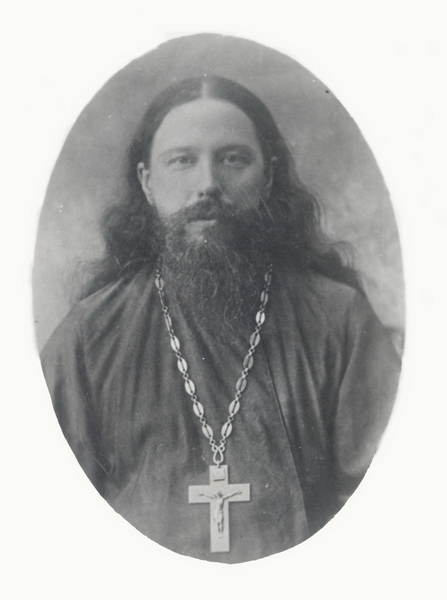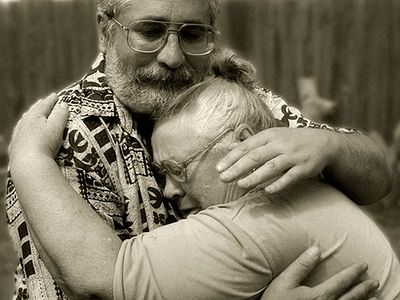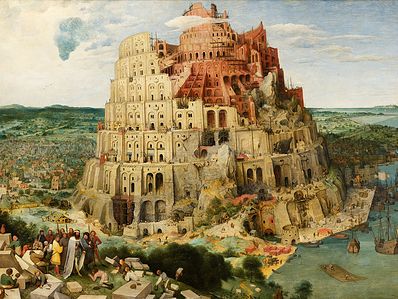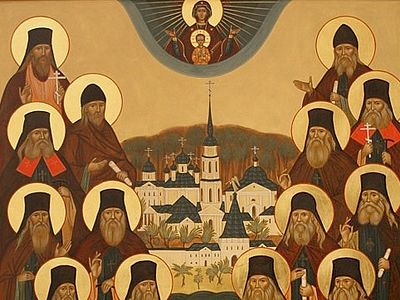On June 25/July 8 we honor the memory of the Optina Monastery holy confessor Nikon. St. Nikon (in the world, Nicholai Mitrofanovich Belyaev) was a great example of patience and obedience—from his youth to the end of his life, he good-heartedly endured everything sent to him by God.
Even in his childhood, there were events that were like signs in his life. In 1888, St. John of Kronstadt visited the Belyaev home. After serving a moleben, he blessed the young mother and gave her his photograph with his autograph and date: “1888, the year of the birth of your son Nicholai.”
The second event was the miraculous healing from a fatal illness. At age five, the boy fell seriously ill. All the doctors’ efforts to save his life were without result. Embracing the body of her cold and breathless child, his mother prayed fervently to St. Nicholas to save his life. Then, a miracle happened. The dead child came back to life. Later Elder Barsanuphius of Optina especially emphasized the mysterious significance of this event as a clear indication of Nicholai’s calling to monastic life.
The young university student Nicholai and his brother Ivan decided to leave for a monastery, but they didn’t know which. They decided write the names of Russian monasteries on strips of paper and after praying, pulled one. On it was written, “the Kozelsk Optina Hermitage of the Presentation”. The brothers took this as an obedience. Thus did the Lord lead them to Optina.
On December 9, 1907, on the feast of the icon of the Mother of God, “Unexpected Joy”, the Belyaeva brothers were accepted into the skete brotherhood of the St. John the Baptist in Optina. They passed through various obediences for about a year, including heavy physical labor, to which they were previously unaccustomed.
Nicholai eagerly and joyfully fulfilled all his obediences: he worked in the trapeza, shoveled snow, carried wood, washed dishes, and swept the floors. In church he was the assistant to the acolyte. He worked in the garden carrying manure, digging, and planting. Pampered and brought up in virtual luxury, unused to physical labor, Nicholai nevertheless did not feel burdened by any of it. His soul knew no despondency, no displeasure, or murmuring.
St. Barsanuphius became the spiritual director to the brethren. In October of 1908, Nicholai was appointed letter-writer to the elder. By that time the young novice had become the closest disciple and co-mystic to Elder Barsanuphius, who foresaw the novice’s high calling, and preparing him to become his successor guided his spiritual life.
In 1915, Nicholai was tonsured into the mantia and received the name Nikon, in honor of the holy martyr Nikon, and in 1917 he was deemed worthy of the priestly rank. This last Optina elder remained in the rank of hieromonk to his martyric end.
After the October revolution, Optina was closed, and persecutions began. “I’ll die, but I won’t leave,” is what St. Nikon wrote in his journal when he was yet a novice in the monastery. These words expressed the common mood of the Optina brethren. The industrious and hard-working monks formed an “agricultural work group” that fed them. St. Nikon labored zealously, doing everything possible to save the monastery.
In 1923, Optina Monastery, just like many other Russian monasteries, was closed.
At the blessing of the last archimandrite of Optina, Isaac II, Hieromonk Nikon remained to serve at the monastery church of the Kazan icon of the Mother of God. “I bless you to serve and receive people for confession,” said Fr. Isaac to Hieromonk Nikon. The latter then remained within the walls of the ruined monastery for another year, spiritually nourishing the tiny community of sisters from the closed convent of Shamordino.
Thus did St. Nikon, out of obedience to the monastery’s abbot, become the last Optina elder. His spiritual children came to him from Kozelsk, and the numerous pilgrims who formerly gathered from all corners of Russia at the graves of the elders also came—the path to Optina would not be overgrown. In those terrible years the true children of the Church especially needed strengthening and consolation, and St. Nikon was capable of providing this spiritual support.
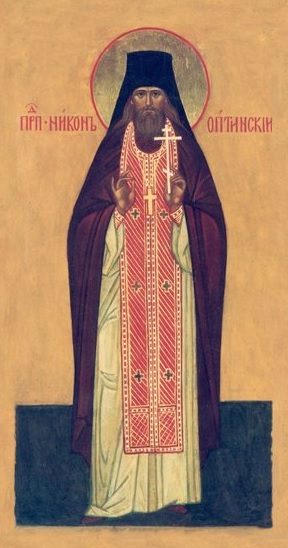
This was his last earthly refuge, the final stage of his earthly sufferings. He found an apartment in the house of one woman, who lent him his lodgings under the condition that he perform all the difficult physical work around the house. St. Nikon’s physical state worsened with every new day, and he never had enough to eat.
One day, due to labor beyond his strength, the sufferer could not rise from his bed. Finally when the landlady learned that he was incurably sick with tuberculosis she evicted him to the winter cold, throwing all his belongings out with him. Then his comrade in misfortune, Hierodeacon Peter, who had also lived in Optina, took the dying Father Nikon to the village of Valdokurie where he himself was living.
During his pre-death illness, despite all the increasing pain and finally total helplessness, Father Nikon remained true to his vow to endure everything; and not only did not complain to anyone about his illness, but did not demand or even ask for anything to ease his torments, never indicating any dissatisfaction by deed, word, or even a look, and humbly accepting everything sent to him as the way it should be.
To the last minute, St. Nikon always fulfilled his prayer rule, read Holy Scripture, cared for his spiritual children, and wrote them letters with his weakening hand.
On the very day of his blessed repose, June 25/July8, 1931, he took Communion and listened to the canon for the departure of the soul. The face of the reposed was white, shining, and smiling with some unknown joy. The Lord gave His faithful servant a peaceful end, and after his death granted him a burial befitting his rank and service.
He was buried according to the monastic rite at the cemetery in Valdokurie. Many of those in exile came to say farewell to him on his final journey. By Divine Providence, there were alone as many as twelve clergymen at St. Nikon’s funeral. Despite the fact that all were working (sixty miles or more from Valdokurie), they suddenly received a day off—as if they had been given leave to attend the funeral.
In 1996, St. Nikon was glorified as local saint of Optina Monastery, and in 2000 he was canonized for church-wide veneration.
Spiritual Counsels of St. Nikon of Optina
Counsel to those living in the world
“If you are a layperson, live among laypeople and do their works…” This should be understood like this: Every form of Christian life has its own virtues and occupations. The works of those whose manner of life differs from ours are inaccessible to us. For example, a mother with nursing infants cannot go to church every day to all the services or read long prayers at home. Doing so would only cause confusion, and even sin, if for example while the mother is gone the child is left to itself and injures itself or makes mischief as it grows.
“She cannot completely divest herself of personal property for the sake of her own podvig, because she is obligated to support and feed the children. She has a duty to please God by the deeds that are natural to her: patient endurance of the burdens of family life, prayer and almsgiving according to her strength, teaching and raising her children, keeping the fasts, going to church on feast days, abstaining from murmuring, gossip, etc.”
On talents and abilities
“By talents we mean not only wealth, education, or fame. Talents are good conditions for salvation of the soul. Each of us has his own given talents. Poverty, sickness, various sorrows—these are all talents.
“From the worldly point of view, talents mean scholarly, musical, or artistic abilities. They are not sinful; it is good when such abilities are combined with a Christian life, and when they are dedicated to God.
“If an ability prevents us from living in a godly manner and saving our souls, then it should be abandoned. It is better to be a little stupider and simpler, but to be saved. What benefit is it to you if you gain the whole world but destroy your soul?”
On sorrows
“A life without sorrows is a sign of God’s disapproval. We should not envy those who live without sorrows, for the end of their sorrowlessness is grievious.”
“We must not boldly throw ourselves into the abyss of sorrows; this would be prideful self-reliance. But when sorrows come of their own accord do not be afraid of them; do not think that they came by accident or circumstance. No, they are allowed by God’s unfathomable Providence.”
“The fruit of sorrows is in the purification of the soul and its spiritual state. It must be preserved.”
“There is not, never has been, nor ever will be a place on the earth without sorrows. A place without sorrows can only be in the heart, when the Lord is in within it.”
On vainglory
“We shouldn’t be vainglorious about health, or beauty, or any other gifts of God… All that is earthly is inconstant—both beauty and health. We have to thank the Lord—thank Him with humility, recognizing our unworthiness, and not be vainglorious about anything.”
When you feel an aversion for someone
“When you feel an aversion for people, or anger, or irritation against them, you have to pray for them, regardless of whether they are guilty or not. Pray in the simplicity of your heart, as the holy fathers counsel: “Save O Lord and have mercy on Thy servant (name), and help me, a sinner, through his/her holy prayers! The heart will become peaceful from this prayer, although not always right away.”
On prayer
“On our own, without Divine help, we are not even capable of praying. We can not pray as needed, and we do not know how to pray or what to pray for.”
“All the time, no matter what you do, whether you are sitting, walking, or working, say with your heart, “Lord have mercy!”
“Everything is gained by prayer. You are only approaching the first step, you haven’t yet ascended it, only approach it and you still have to enter the door, but you can’t go in by any effort if God’s mercy is not there. That is why you first of all need to ask, “Open unto me the doors of Thy compassion, O Lord!”
“When you are in sorrows or despondency and heavy temptation has found you, keep repeating this: “O Lord spare, save, and have mercy on Thy slave!” and the sorrow will be eased.”
“Try not to skip your prayer rule, morning or evening. But if you skip it sometime for some reason, especially if it is due to circumstances beyond your control, do not be upset, but humbly reproach yourself for your weakness; for self-reproach is an unseen ascent, while getting upset, in the words of Elder Ambrose, is not listed anywhere in the virtues.”
On passions
“Victory over the passions is accomplished through God’s power. Our feeble powers are not enough for this. We need to be humbly aware of this and with humility attract God’s mercy and help to ourselves.”
Holy hieroconfessor, Father Nikon, pray to God for us sinners!
